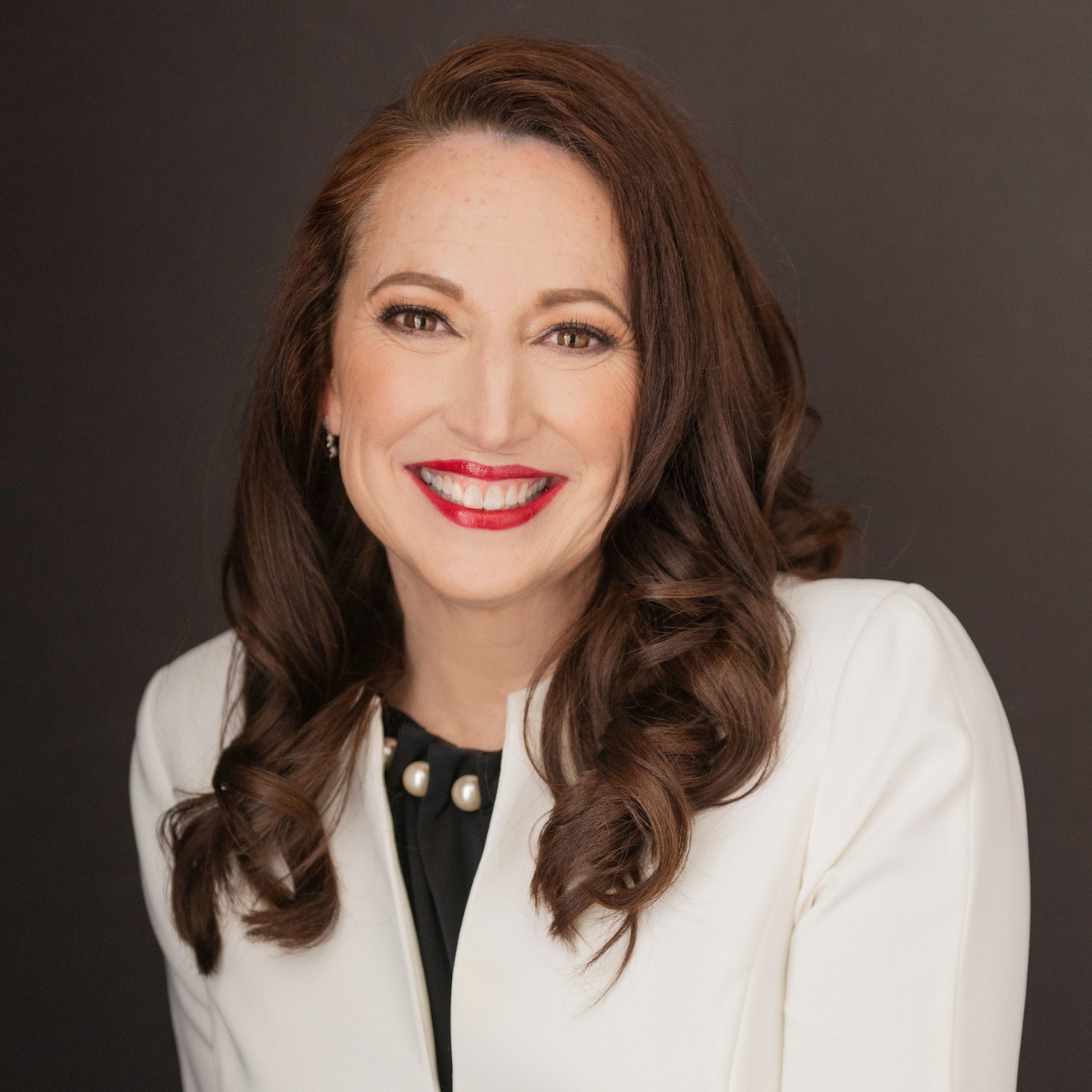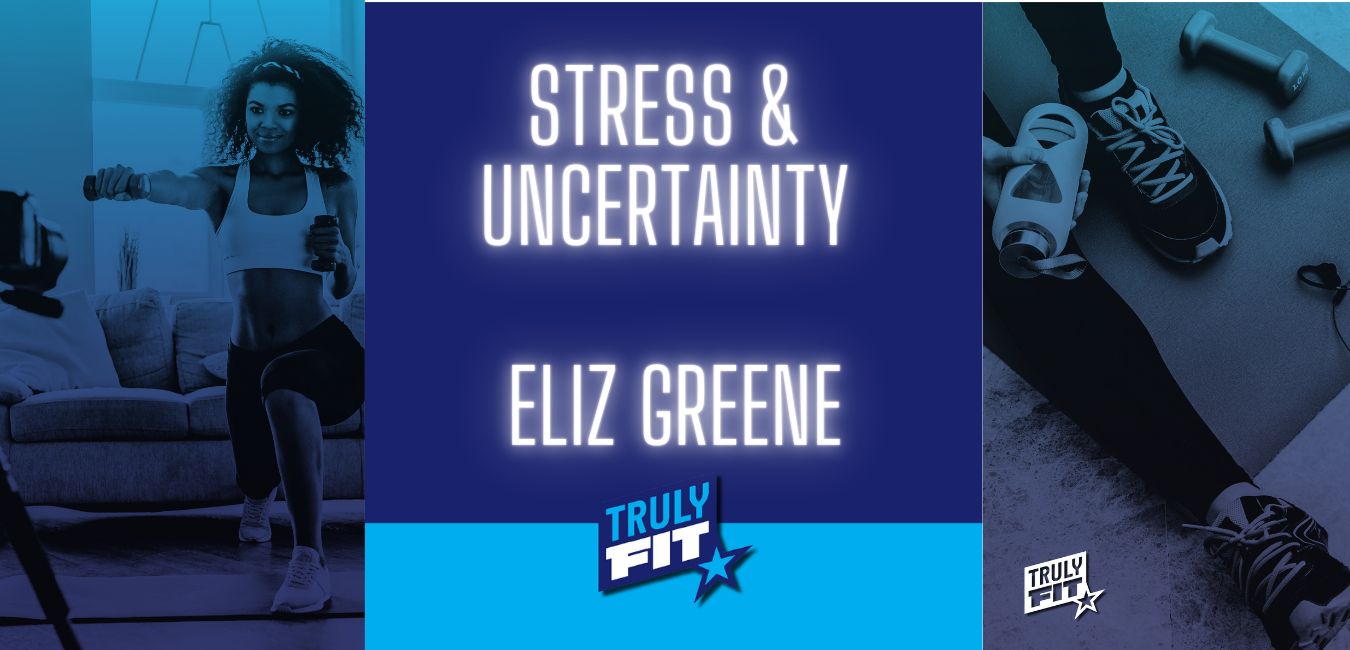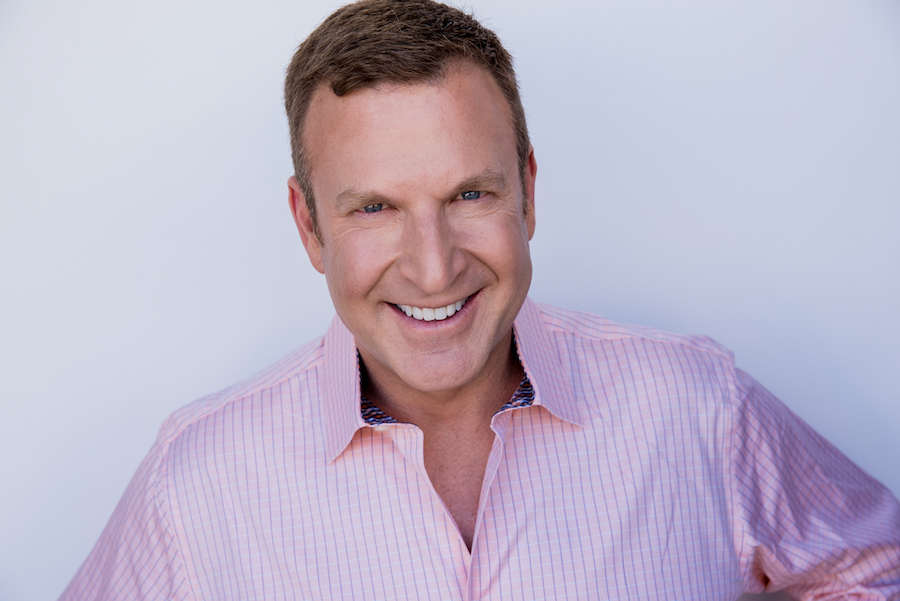
Stress & Uncertainty with Eliz Greene

Guest: Eliz Greene
Podcast Release Date: 5/19/2021
CLICK FOR AUDIO OF PODCAST
Welcome to Trulyfit the online fitness marketplace connecting pros and clients through unique fitness business software.
Steve Washuta: Welcome to the Trulyfit podcast I am your host, Steve Washuta, co-founder of Trulyfit and author of Fitness Business 101. On today’s podcast, I speak with Liz Greene.
Liz is the author of stress-proof your heart. She is a speaker and advocates for heart health. She deals with helping people become stress-proof & dealing with high-pressure situations. She’s worked with people from the likes of NASA to Colgate-Palmolive. Today, Liz and I will talk about:
- The physiological effects of high stress
- Steps in becoming stress proof
- Different strategies that you can implement based on who you’re dealing with (manager vs employee, husband vs wife, college student vs CEO)
- How as personal trainers can help our clients become stress proof
- Is everything surrounding becoming stress proof advantageous for you?
This was a great conversation, you’re gonna get a lot out of this again, you will find her at www.ElizGreen.com, and with no further ado, here is Liz.
Steve Washuta: All right, Liz, thanks for being here with the Trulyfit podcast. I’ve already given you an introduction on the front end. So the listeners know, but let’s give a brief bio of exactly how you got to do what it is that you’re doing right now.
Eliz Greene: Well, my daughters would tell you that they gave me my job. My launch into stress management and health really started when I was 35 years old and seven months pregnant with twins. I suffered a massive heart attack, and that was a changing day, you know, anytime you become a parent is a changing day. Having twins would have been quite the overwhelming and uncertain sort of experience in life.
But you add on top of that, a heart attack, open-heart surgery, and a C section. That was a lot in one day. We really had a lot of uncertainty and overwhelmed thrown at us. But also, I was given the gift of really being very clear about what was important to me. It was really those two little babies who, fortunately, even though they were seven weeks early, were pretty darn healthy. My husband, as long as I had that I knew that I was willing to do anything to make sure that I got to be with them.
They’re 20. Now healthy college students, and I am soon to be 56. So we’ve done pretty well. In that process, I gained a lot of insight in terms of what to do to protect my heart. A lot of that has to do with managing stress.
Steve Washuta: Well, my wife is currently pregnant in the third trimester due July 8. So, I’m sure I will be using a lot of this information to manage my inevitable stress coming out. But you know, I know there’s a lot of things, we talked about stress management that is abstract. How to make sure that your well-being is sort of, you know, together.
I want to delve directly into the physiological first. What are the physiological components we’re dealing with when we’re talking about stress in the body?
Eliz Greene: Honestly, this is the thing that I find the most fascinating about stress. I often say that stress isn’t good or bad. It’s just a very hardwired wired reaction in our body. So let’s say we’re driving down the highway. We’re getting to an on-ramp and whoever’s coming on, it’s going fast. Maybe they’re talking on their phone and they’re not paying attention. You look to your left and there’s a car there, you’re not going to be able to get over. That is a stressful situation.
Your body reacts, pumps cortisol into your system, that’s the stress hormone. That hormone makes all kinds of things happen in our body, our heart rate goes up, our blood pressure goes up, our blood even gets stickier. So if we were in that car accident, we possibly wouldn’t bleed to death, all great things. When we’re looking at a car accident right?
Now let’s say you’re able to get over that that personal left lane hits the gas and makes room for you and you get over. Now that crisis has passed, that cortisol comes back down or blood pressure goes down or heartbeat goes down or blood gets less sticky. Cool. That’s what it’s supposed to do. It’s supposed to go up when we need to go back down when we don’t. The problem is when we’re dealing with a high level of stress all the time, that cortisol level stays high.
Our blood pressure stays high, our heart rate stays high in our blood stays sticky. And guess what? That is not good for us. So that’s the problem. That’s the physiological thing that happens to us, and as a result that high cortisol level can make us feel all kinds of different things. It can make us feel jittery, it makes it hard for us to get to sleep. It can have some psychological effects to it impedes our ability to think creatively and critically, because our brain is dealing with this high alert, and not being able to sort of sort through things. When we need it, that cortisol reaction is great. And frankly, that’s what makes life fun.
You know that your body doesn’t know the difference between that car, a potential car accident and a surprise birthday party, same reaction. That’s what makes life fun. So life without stress, Lauren, you just need to get that cortisol level down when you don’t need it.
Steve Washuta: Well, that makes perfect sense. That reminds me of when you’re on a plane, and you feel the turbulence going on, you think you think that this is it. So much so that you might have last wishes to whatever higher power you believe in, and then the plane lands and you almost never talk about it, right? Because the cortisol levels have already dropped. It’s already past you. So, all that does make sense.
With that being said, what are the first steps in becoming stress-proof? I know that typically, in the personal training world, we talked about when taking the first steps, the worst thing to do is go from zero to 60. You don’t want to get off the couch one day having not worked out in a year and try to run a marathon, right? There needs to be sort of an incremental climb up that mountain. So, what exactly are those when becoming stress-proof?
Eliz Greene: I think small changes make big differences that in all things. So when you’re starting a fitness routine, Small changes can make a big difference in getting up off the couch. The first step, good idea. Just get up for stress.
One of the first steps is just recognizing how much stress you’re under. By nature, one gets acclimated to a level of stress, and we think this is normal. So without backing up, and using some sort of measurement to say, whew, I think I’m actually stressed and that could just be paying attention. Am I having trouble sleeping? Am I having headaches or symptoms? That would indicate you know, am I feeling jittery Am I is my stomach upset, or those sort of things can be clues that your stress level is really high. Things like staring blankly into your computer and wondering if you’re ever going to string together a reasonable sentence again, that can also be a sign of stress.
So paying attention is the first step. But then what is great is your body is naturally designed to let that cortisol or a beer system. You can cue it to do that. So you’re going to love this tip, I know you will. If you raise your heart rate, keep it up there for a while and let it come back down. That is signaling your body to let cortisol out of your system, which is why physical activity can be an antidote for stress. That’s why a lot of the times when we work out, or even just take a walk outside, we feel better because we told her our body like, excuse me time to let that go.
Steve Washuta: Well, that leads right to my next question. Is exercise not a crutch of some sort for clients who are very stressed? Maybe they work in a high-stress office? Or maybe it’s a young mom who has twins, and she’s dealing with crying toddlers at home, and they come in and they think the way to get rid of their stress is to sort of work it off, right? I need to run on the treadmill, I need to work out with my trainer. Is that not a crutch? Or is that okay?
Eliz Greene: I don’t think it’s a crutch. I think it’s actually a wonderful tool to be able to manage to tell your body Okay, this is tough. Plus, it does a lot of other things. It’s not just raising your heartbeat. You’re changing your breath when you’re exercising. That’s another signal to your body to let that go.
What’s interesting is exercise is the only thing that changes our breath. I know what before we started you were talking about yoga. One of the ways that Yoga is beneficial is that it does lengthen and deepen your breath when you’re stressed. We take short little shallow breaths, anytime you like them, and deepen them. That is another signal but that cortisol goes up. So that’s a great thing singing if you’re, you know a fan of singing either in a group and a choir or you know, in your car or your shower.
Again, you’re lengthening and deepening your breath and that can be a signal so find those ways. Those are crutches those are actually tool skills that you can use to tell your body to let go of that cortisol get back down to normal and be able to recover from particularly stress, you can avoid, you know, the toddler is not going away, the job is not necessarily going away, you need to give your body a chance to recover.
Steve Washuta: Well, if you hear me sing I promise you, your stress levels will not go down. So please don’t ask me to sing. I want to speak about uncertainty, which is a big portion of your book. I actually write about uncertainty in my book as well. What I talk about is, as a trainer, a lot of times you’ll walk into a situation where you thought you had a plan.
So, maybe my plan was to put my client on the cable machine, and I had a whole workout designed around the cable machine, and I walked in, and there was already another trainer, working with their client on that machine. Now I have to pivot and go in a different direction. Now, sometimes those curveballs can be nerve-racking for trainers because they don’t know what to do next, their client sees that, that they’re panicking, right, their cortisol levels are going up, their adrenaline’s up, and they don’t know what to do. That’s a bad thing.
I talk about why it’s important to get ahead of that. Show up to the gym 30 minutes early, assess the situation, be ready for the curveballs, and write out a few different alternatives.
I’ll come to the question finally, is there a point of diminishing returns? What I mean by that is, can you be so over-prepared, where in turn that is causing you stress?
Eliz Greene: Well, let’s back up a second and talk about why that uncertainty is so stressful. Our brains like predictability. That is how they function. One of my favorite studies that I read as part of the preparation for my book is a study where they brought people in clearly college students, because who else signs up for this, and it was a mock thing where you pick up a rock, and either there’s a fake snake underneath there, or there’s not, if there’s a fake snake, you get an electrical shock. Again, who signs up for this, but okay.
What they discovered in this, and I’m making this very simplified, what they discovered in this process was, if you knew for sure that there wasn’t a snake underneath there, clearly, that’s not stressful. If you knew for sure there was a snake under there, it was less stressful than not knowing. We don’t like that unpredictability.
Let me think about it a different way. If you are called into your boss’s office at 4:30, on a Friday afternoon, one of three things is going to happen. Like you love your boss, you have a great react, relationship. And that is not stressful. You know, you’ve screwed up, and you’re probably getting fired, stressful, but not as stressful as not knowing why you’ve been called in.
So we’d like predictability. So what you’re talking about is being prepared, making the plan that is an attempt to make an unpredictable situation more predictable, doesn’t mean you get to use the cable machine, it means that you have the time to adjust if you can’t. And there’s a process in the book that I use, really looking at what are the things you can control on what are the things you can’t control, you can control when you show up, that makes the situation feel more predictable.
You can’t necessarily control who’s using that cable machine. So making a decision about what you can control what you can’t control, and then take steps to control the things that you can and talk to yourself about those things in a way that makes you feel more secure. It doesn’t necessarily mean that you are secure. You’re creating your manufacturing that security, which is the antidote to the uncertainty.
The other thing that I want to share is back in the day, I was a dance teacher and choreographer. I would go into schools and daycares bring my bag of tricks and go in I too, would have a plan. It would also often be hijacked by Oh, well, you can’t have that room today. Or, you know, guess what pinkeye is, you know, you can’t share any of your props that you brought that the kids really like.
So one of the things that I always coached other teachers about was having a bag of tricks available. And for me, that was literally a bag of tricks. I had all kinds of things in my car that I could pull out and have the kids engage with. Same idea for coaches. I am sure What are What’s in your bag of tricks when you feel secure in your bag of tricks knowing that, okay, well, if the cable machine is not available, I can go do this. That makes you feel more secure as well.
Steve Washuta: Now, you can push back on this and I don’t mean to speak for you, but it seems like it’s okay to be stressed. Because that allows you to understand how to control the stress, right? If I avoid stress at all costs, then when those curveballs come, I’m I might not know how to react in my body, right? I almost want to be in circumstances in which I understand, like you talked about earlier My body is is this is considered a stressor, but I know what to do now.
Eliz Greene: Right. You can’t avoid all stress. If the last 15 months have taught us anything, things happen. We cannot control them, we can choose to control the things that we can, but we can’t control who’s allowed to come into a place of business, you know? Who’s sick, that sort of thing. That’s just part of life. I never talk about eliminating stress. I talk about recovering from the stress we can avoid, and really creating systems and skills so that we can do that and live a purposeful, valuable life.
Steve Washuta: Do you give recommendations based on a person or position or generation if I am a CEO as compared to a low-level employee if I am a woman compared to a male if I was Gen Z compared to Gen X? Are there different nuances of our personalities that make us more likely to claim to certain stress-related like fixers for lack of a better term?
Eliz Greene: I love this question. I have two ways to address it. First, I want to talk about the research that I did that on, you know, 1000s of people in all kinds of job positions in actually all over the world. There isn’t a difference in terms of what causes stress, men, women, executives, frontline workers, the same things consistently, overwhelm and uncertainty are the cause of stress. There are some differences by generation or possibly sort of life stage, in terms of how we react to uncertainty. You know, depending on where you are a change at work for boomers, they are almost out the door.
So it’s frustrating, but less stressful in some ways because they are getting closer and closer to retirement. So hopefully, planning-wise, that isn’t so much of a struggle. Whereas I am hunkering down and just trying to weather the storm.
Millennials are far less tolerant of uncertainty in the workplace. So the very moment things start to look sketchy, they are looking for the door, they are not going to be the last person off the train. I’m interested to see when our Gen Z group enters, what that is going to look like. So that’s the research part of it. What do people need? Are there differences in terms of how we recover from stress? Absolutely. But it’s not generational gender, or anything else. It’s what you actually need.
So I’m sure that you have worked with some clients, where perhaps you’re trying to sit for yoga, and they cannot shut off their brains. Like actually sitting and listening to their breath. It causes them more stress because they’re thinking all about all the things they could be doing right now. Stress recovery is not a one size fits all proposition. The same strategies aren’t going to be successful for everybody. It’s finding out what you actually need.
I tell a story about a trip that my husband and I took for his 50th birthday. He loves to scuba dive and I don’t, and my cardiologist would really not like me to scuba dive. But we live in Wisconsin, which means he dives in a very cold Lake most of the time. This was a great fun gift for his 50th birthday. We went down to warm water for him to scuba dive with two other couples. After they would scuba dive in the morning, we’d have lunch and the other couples would retire to the pool.
We started to refer to our friends as the iguanas because they loved to lay around and have a little beverage, which was great. My husband can’t sit still that long. So we were in and out all day long doing different activities. Until one day, one of the gentlemen said to my husband- are you going to relax or are you go go go all the time. My husband said I am relaxed. I’m like a border collie. If I don’t have something to do, I start chewing on things. Iit was one of those times in our relationships where it’s like, this is very true. And that’s the difference.
There are some people that are more like our friends hanging out at the pool that like that quiet contemplate of time, that’s how they disconnect from the cause of stress. There are some people that are more like my husband, where if they’re not occupied and distracted, they can’t hope but he’s not chewing on furniture, he’s chewing in his brain about what’s in his inbox and whether the project that he delegated is being done, he needs the ability to be distracted and occupied.
He’s not thinking about the things that are causing him stress so that he can let that recovery happen. It’s about what do you personally need? Recognize that for yourself, and perhaps, in your own relationship? Maybe we don’t need the same things.
Steve Washuta: Yeah. I think understanding yourself in that context makes perfect sense. When I work with my trainers, there are two different kinds of trainers. I mean, there’s more than that. However, I divided it into two categories, direct, and demonstrative.
The direct trainers are the ones who look at the body and they think it’s a machine they go to fix. This is wrong, you have knee valgus, your hips are off, and I know how to fix it. Then there are more demonstrative trainers who provide an experience, they want to connect with their client, they want to ask them, What do you want to do today? How do I make this fun, it’s about building a relationship. Neither is right or wrong, as long as you’re giving your client what they want and as long as you understand your personality. Ensuring you are working to its advantage instead of working against yourself.
Eliz Greene: Sure, absolutely. One type of coach is going to be a fit for some people and another may be for somebody else. There may be people who need different things at different times. So there may be people who are kind of in the middle of a border collie in Atlanta, and sometimes they need to be highly distracted. Sometimes they do need that quiet, calm contemplation of time. And that’s okay, too.
It’s just recognizing what you need. And more importantly, giving yourself the permission to actually do it. Because sometimes, those things seem very selfish, like, oh, I’m gonna go take an hour and work with my personal trainer, that’s kind of selfish, and I should be doing other things like I need to be with my family. Now if that actually allows you to disconnect from what’s causing you stress, even better signals to your body to let go of that cortisol, and feel better at the end of it. That’s not selfish, that is just maintenance of your system. That’s really just skills to live a healthy, productive life,
Steve Washuta: I want to go back to uncertainty. One of my favorite authors, he’s a bit controversial, so I’m not going to say his name, if people can figure it out, they can figure it out. But basically, he says something to the extent and I’ll paraphrase that we prefer a junk or fake theory to no theory at all. Meaning: As humans, we’d rather have bad information and pretend that that’s the answer than to have no answer at all.
So sometimes, when I’m putting something together, it’s less stressful for me not to know and I go, you know, what, this is the answer. I have to sort of take a step back and say, You know what, maybe I don’t have all the all of the data yet. I need to wait before I make an answer. Is there a technique or process you use to remind people that it’s okay to not know, basically? Huh? Oh, that’s a good question.
I’ll phrase it another way if insofar as stress. If there is a situation, which not knowing is inevitably going to cause stress do I tell myself, it’s okay not to know? Or do I not go into the situation at all? How do I avoid the stress of knowing I’m not going to know?
Eliz Greene: That’s a really good question. My answer to that is personal. I really delved into this work after my girls were born and I’m recovering from heart surgery. It was a very uncertain time. Because what happened to me is a rare complication of pregnancy that very rarely happens.
Unfortunately, most women it happens to don’t survive it. I just happened to be in the hospital on bed rest, so I got great medical care right away, but my health was very uncertain, still is. It is what I carry with me, I have a part of my heart that doesn’t beat anymore. Going out and doing what I do well, before, everything happened in March of 2020, I would get on a plane and go travel somewhere and speak to people, which that that’s my job as a professional speaker, leaving my house where everything is very safe and secure. And I feel comfortable and traveling somewhere else.
That created a lot of anxiety, and I needed to be able to leave because staying in my house is not healthy. Need to be brave enough to go out there. But in order to do that, I really needed to think through the what-ifs. Well, what if I go, and I have a problem.
So early on, still kind of today. I always know where the closest Heart Hospital is. I’m really good at spotting if there are defibrillators in places, you know, whether that’s the airport or the hotel where I’m staying. I carry an emergency card in my wallet that gives all of the information someone would need. If I’m not able to give information myself. Those are things I put in place for myself to handle the situation that can’t be no.
The same process no matter what happens. It’s the same process as what can I prepare myself like you were saying, show up early? What can I do in advance that will make going into this very uncertain situation feel more secure? That’s how you lower the stress of the situation?
Steve Washuta: Yeah, well, there’s only so much we can do, right? Your steps. You run down your list, you have your things you feel comfortable enough, but like you said, stress is unavoidable. It’s not that we need zero stress in our life. It’s that we need to learn how to handle the stress, right? That’s what your book helps teach us. So why don’t you let the listeners know where they can get more information, not just about your book, but where they can maybe find more about you or reach out to you directly.
Eliz Greene: They can go to stressproof.com. There, you’ll find the border collie/iguana quiz. So, if you want to know where you lie on that scale, you can find it there. You can, of course, find the link to my new book, and related articles and resources.
Steve Washuta: Go get the book, visit the site, find out if you’re a border collie or an iguana. I can tell you right now I know which one I am. This was a pleasure and I hope maybe we can speak again on another podcast.
Eliz Greene: Oh, I would love to do that. Thanks. This has been a joy.
Steve Washuta: Thanks for joining us on the Trulyfit podcast. Please subscribe, rate, and review on your listening platform. Feel free to email us as we’d love to hear from you.
Thanks again!
CLICK FOR AUDIO OF PODCAST
YOUTUBE VIDEO: Stress & Uncertainty with Eliz Greene





